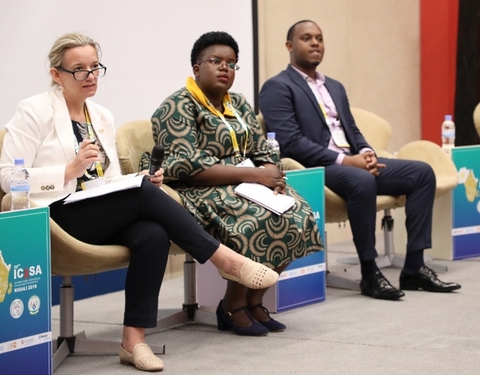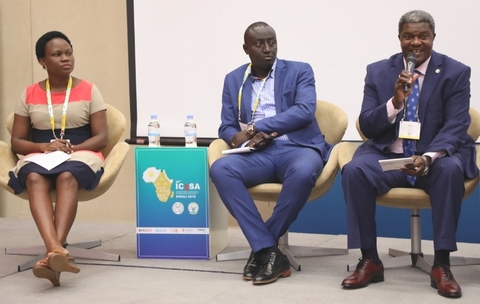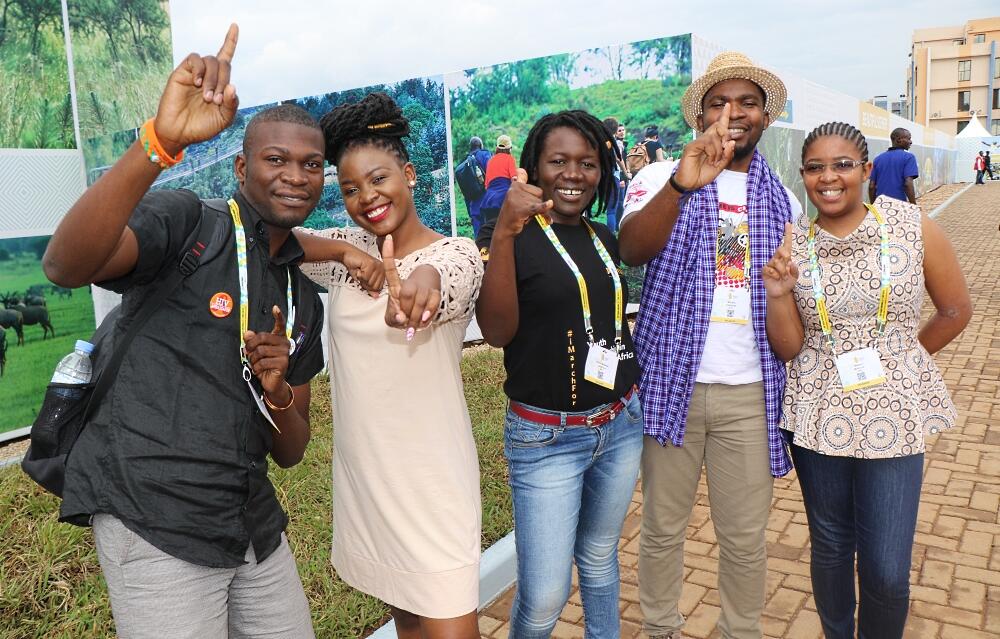KIGALI, Rwanda, International Conference on AIDS and Sexually Transmitted Infections in Africa (ICASA)—Ending AIDS and achieving universal sexual and reproductive health and rights requires moving from a disease-specific approach to one that meets the sexual and reproductive health needs and expectations of people throughout their lives, beginning when they are young.
Young people have been UNFPA’s best allies in the fight against HIV.

Southern Africa, moderating a session. With her are Violet Gwokyala,
Makere University: School of Public Health, Uganda and Dr. Jean
Olivier Twahirwa Rwema, Johns Hopkins University, Centre for
Public Health and Human Rights.
© UNFPA Rwanda/Aimable Twiringiyimana
UNFPA hosted two dynamic satellite sessions on addressing the needs of young people and those left furthest behind.
“Young people have been UNFPA’s best allies in the fight against HIV. You have showed us, on more than one occasion, the power of your united voices,” said Justine Coulson, UNFPA Deputy Regional Director for East and Southern Africa.
HIV remains one of the biggest threats to the advancement of sexual and reproductive health and rights (SRHR) in Africa. UNFPA has made ending HIV a priority through dedicated partnerships with civil society, academia and governments.
Putting people at the centre of SRHR/HIV integration

Dr. Felix Sayinzoga, Ministry of Health, Rwanda, and Dr. Michael
Katende, Secretariat of the East African Community.
© UNFPA Rwanda/Aimable Twiringiyimana
UNFPA co-hosted a satellite session with USAID West and Central Africa, the Government of Sweden, UNAIDS, the Centre for Public Health and Human Rights at the Johns Hopkins Bloomberg School of Public Health on integrating SRHR and HIV services to optimize the potential impact of these programmes.
In a region where HIV rates are high, contraceptive prevalence is low, and health-care providers are strained, East African Community (EAC) partner states have been integrating SRHR/HIV policies, programmes and services to close resource gaps and strengthen health service delivery systems.
“SRHR/HIV integration is essential to meeting international health goals, including the SDGs, as it reduces inequities and improves the quality of care,” said Dr. Michael Katende, Principal Health Officer and Coordinator, EAC Integrated Health Programme.
SRHR/HIV integration is essential to meeting international health goals, including the SDGs, as it reduces inequities and improves the quality of care.
However, in most EAC partner states, documentation and data on the uptake and outcomes of integration are lacking. This session featured five studies that sought to close this evidence gap. The studies looked at the knowledge and use of safer contraception methods among HIV-infected women, the gaps and priorities in preventing vertical HIV transmission and meeting the SRHR needs of female sex workers, and community-based HIV prevention, harm reduction and SRHR services for women who inject drugs.
The studies showed the perceived benefits, challenges, inhibitors and enablers of integration, and the level and scope of reproductive, maternal, newborn, child and adolescent health (RMNCAH) and HIV/AIDS integration of policies, service packages and standards in the EAC region. A major finding was that there are different understandings of integration across partner states, which influences what services are provided, who receives them, and the impact they are having. The quality of care across the EAC is therefore uneven.
Recommendations
- We need to work together and strengthen coordination structures to support integration. Some interventions are not being addressed in existing integrated service packages, which are missed opportunities.
- Capacity building is vital for staff to support the delivery of integrated services and should include refresher training and supervision, and updating protocols.
- Data and knowledge sharing should be strengthened. While routine reporting is encouraged in all partner states, joint data use is limited.
- Leadership is needed at all levels, from national government to community health workers to youth and people living with HIV. Innovation happens when policies and guidelines are developed collaboratively, and data and lessons on implementation and monitoring are shared.
- Health-care providers must be accountable, committed and collaborative. Health-care infrastructure, equipment and supplies must be available.
Youth-driven solutions to multifaceted HIV risks and vulnerabilities
If Africa is to achieve an HIV-free generation, having young people lead the charge is the only way forward. UNFPA organized a session where young people from East and Southern Africa looked at unbiased, multi-dimensional and innovative solutions to ending HIV.
We must engage with youth to capture a full range of perspectives and recognize the bi-directional vulnerabilities of the incarcerated, persons with disabilities, the HIV-infected, and other groups of marginalized youth.
An important message was that in the race to meet the 2030 target to end AIDS, no one must be left behind. “We must engage with youth to capture a full range of perspectives and recognize the bi-directional vulnerabilities of the incarcerated, persons with disabilities, the HIV-infected, and other groups of marginalized youth,” said Maria Bakaroudis, Comprehensive Sexuality Education Specialist for UNFPA East and Southern Africa.
Although real progress has been made in driving HIV infection rates down and the use of SRHR services up, there has been a three per cent increase in HIV infection among young women. Other challenges include the attitude of health-care workers, which discourages youth from seeking SRHR services, and social, economic and legal barriers, particularly for young women who face tough barriers with entrenched gender norms and inequalities.
Recommendations
- Increase access to SRHR literacy through comprehensive sexuality education in and out of school.
- A community of support and an appropriate package of services that youth feel comfortable accessing are critical.
- Youth-friendly health facilities, equity and non-discrimination are key for everyone to access services, and a more conducive legal and policy environment are needed to protect this access.
- Strict age-of-consent laws should be made more flexible to prevent criminalizing young people.
- We need to meet the SRHR needs of youth in humanitarian contexts to build their resilience.
As UNFPA and partners go forward in a bid to end HIV and AIDS in Africa, we must change the way we work together to respond to the SRHR and HIV needs of women, young people and key populations by fast-tracking SRHR and HIV innovations, by creating conducive environments for young people to access youth-friendly SRHR services, and by holding leaders accountable for the laws and policies created.
- Sandy Pederson and Cleo Okumu


